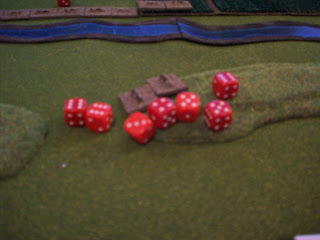To
say that Captain Castagne was unimpressed by Father McCruil's victory
at Lochlann's Tower was to compare drizzle to a thunderstorm. He tore
up his quarters for two days, and for a week longer he sulked as his
sergeants drilled the King's Own Royal Borderers mercilessly, hoping
to avoid any repeat performances.
The
Captain only brightened up when the Independent Companies under
Captain Campbell arrived. With reinforcements to hand, he decided to
personally lead an expedition against McCruil – and a certain
garrulous peasant had given him just the information he needed...
McCruil
and his men were hiding in Caleduin, a small village in the hills.
For want of a simpler plan, Castagne decided to catch the rebels in a
pincer movement, dividing his forces in an attempt to ensure the
enemy's destruction. Would the Scots stay in the village and be
surrounded, or would they sally forth to destroy Castagne's
expedition piecemeal?
In
jealous recognition of his sterling work thus far, Castagne ordered Frost
away from his regiment to assist Captain Campbell, keeping Corporal
Armstrong to help him with his own unit.
 |
| Royalist entries; Jacobites on blinds. |
Campbell
opened proceedings, moving his column towards the village. Castagne
and his firing line were slow to follow – perhaps the captain was
reconsidering the wisdom of his piecemeal approach? Eventually, the
captain began giving orders, and at a cough from Armstrong, the
firing line moved quickly over the open ground towards the village.
Their speed was cruelly repaid as a group of Scots appeared from
inside one of the houses, running to the wall and opening fire.
 |
| Scots appear! |
At
the sound of gunfire, Campbell – a Flanders veteran – moved his
men into line, knowing full well the effect of musketry on a packed
column of men. Still without a real target, the Scots marched bravely
on, tensely awaiting their own black powder welcome. They swiftly
received it, but as they ducked, they realised that these Scots fired
no better than their grandmothers.
 |
| The lines advance on Caleduin. |
Castagne's
men returned fire, doing nothing to even upset the defenders.
Campbell's independent company had more panache: they advanced to
within spitting distance before unloading their muskets at the
defenders.
 |
| I'm sorry, would you care to repeat that? |
The
stone wall stopped the greater part of it, but nonetheless the rebels
were cowed by the weight of fire that fell upon them. Their return
fire did nothing to shake earlier comparisons. Frost restored order
to the line and, though unaccustomed to this English sergeant, the
Scotsmen did his bidding, reloading their guns in record time.
Much
aggrieved by the Jacobite show of defiance, Castagne ordered his men
to reload and advance. Once again they moved into the teeth of enemy
fire, but the bullets flew wild above their heads. Campbell's men
advanced too, firing as they went; they were now almost nose-to-nose
with Caleduin's defenders.
Again
Castagne slowed down, his vacillation worrying the men almost as much
as the chance of being shot. He must have caught wind of this,
because all of a sudden he ordered a general advance against the
village! The Borderers charged in, but the Scots, fighting with the
ferocity of cornered rats, drove them off, killing almost a quarter
of those sent in and wounding Castagne himself. Some distance from
the walls, he managed to rally his men, and began preparing them for
another charge even as Armstrong tended to his wound.
 |
| Walls: The great equalisers. |
On
the other side of the village, Campbell's men were getting the better
of their exchange of fire with the defenders. Seeing no better
moment, he stormed the walls himself, unaware of his commander's
recent failure. The Jacobites again fought bravely, but were no match
for their countrymen. Campbell barely avoided being stabbed in the
throat, but his opposite number wasn't so lucky – Douglas, the
Laird's brave young son, died in the melee. This was all too much for
the Jacobites. Already wavering under the disciplined fire of the
independent company, the loss of their lord and of the walls sent
them into headlong flight, abandoning their friends to whatever fate
awaited them.
 |
| The redcoats enter Caleduin. |
Unfortunately
for Campbell's men, there was not even time to breathe before a
counter-attack came surging from within the village, flanking his
force – and at its head, Father McCruil himself! It was a
protracted, bloody fight, but at the end of it, Campbell's few
survivors had been forced back, leaving Frost's detachment alone in
the village to face the mad priest.
 |
| Campbell is forced to retreat. |
Relying
on the bond made on the march up, Frost pushed his men into order,
and gave the command to open fire. By grim luck, and the by the
beating Campbell's boys had given them, this was enough to break the
spirit of the men threatening him, enough to drive them right off the board.
At
this point, the last few Jacobites slunk away, happy to have given
Fat George a bloody nose.
 |
| The end of play. |
Butcher's
Bill
Royalists:
11 men, Captain Castagne wounded.
Jacobites:
8 men, Douglas MacDonail killed.
Overview
A fun game, which got tenser than
I thought it would. Father McCruil escaped again, the wily little
beggar! Captain Castagne won't be happy about that, nor about Captain
Campbell's professionalism, which rather showed him up. Despite the
Independent Company's superior achievements, both detachments took
roughly equal casualties, which certainly won't look good back in
Edinburgh.
The Jacobite morale turned out to
be very fragile. In future, I shall move all my Big Men off blinds as
soon as may be. While the ambush against Campbell's men did well, it
robbed me of vital Shock-reducing powers. Ah well, you live and
learn.
And while loyal men live, the war
continues... Long Live the King!
































